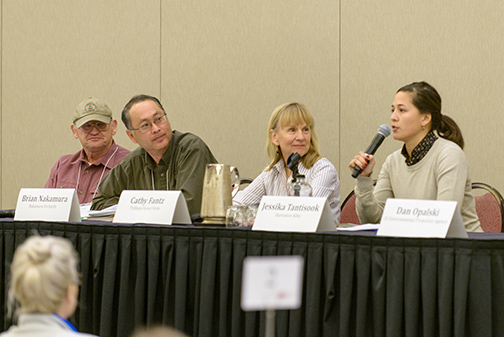Toxics Reduction: Successes and Challenges
The morning session focused on farmers, growers, and foresters. The goal of this workshop was to help farmers protect water quality, improve farm yields, reduce health risks, and increase economic viability. Farmers on the panel represented a diversity of perspectives and crops, ranging from conventional large-scale fruit tree operations to strictly organic farmers who sell products directly to consumers. Presenters were:
- Jessika Tantisook, Starvation Alley Cranberries: Jessika and her partner Jared Oakes run Starvation Alley Social Purpose Corporation, a farm and cranberry company in Long Beach, Washington – the state’s first organic cranberry farm. Jessika spends much of her time building their new business that supports regional cranberry farmers through the organic certification process. Starvation Alley is Washington's first organic cranberry farm.
- Cathy Fantz, Trillium Christmas Tree Farm: Cathy and her husband Roger own Trillium Forest Farm, an organic Christmas Tree farm. The entire farm uses toxic-free, environmentally friendly, sustainable practices. Over the years, they have added other income-producing crops from the farm have included Christmas wreaths, logs (for milling and for stream bank restoration), firewood, apples, pears, various kinds of berries, vegetables, cut flowers, eggs, native landscape plants, and mosses.
- Brian Nakamura, Nakamura Orchards: Brian is a third generation Oregon orchardist. He and his wife grow pears and sweet cherries on 58 acres in the Hood River Valley. He participated in the formation of the first Oregon DEQ Pesticide Stewardship Partnership between agricultural producers and regulatory agencies in 1999.
- Clair Klock, Klock Farm and Nursery: Clair and Beverly Klock have operated the 27 acre Klock Farm for the last 35 years specializing in blueberry and caneberry production. Clair practices a strict form of Integrated Pest Management, reducing the fertilizer and pesticide use on a leased farm by 50% and increased the production and net profit margin.
The afternoon session focused on reducing stormwater impacts, drawing on experiences from builders, developers, local governments, and others. Presenters were:
- Matt Graves, Port of Vancouver USA: Matt is the Environmental Manager at the Port of Vancouver where is focuses water quality where he manages the port’s stormwater, wastewater, and drinking water permit compliance. He holds two Bachelor of Science degrees from Oregon State University in Geology and Geography. He is a licensed Geologist in the State of Washington as well as a Certified Professional in Stormwater Quality.
- Jane Bacchieri, City of Portland Watershed Services: Jane is the Watershed Services Group Manager for the City of Portland’s Bureau of Environmental Services. She oversees planning, restoration, and monitoring activities in Portland’s watersheds to manage stormwater, protect water quality, and enhance habitats for fish and wildlife.
- David Humber, Humber Design Group: David is a local civil engineer specializing in redevelopment of the built city. He has almost 25 years of experience designing private stormwater management facilities for dense urban redevelopment and infill projects primarily focused in Portland, Oregon. He has a great deal of experience with stormwater permitting.
- Doug Warneke, Toyota Logistics Services: Doug is a production supervisor at Toyota Logistics Services (TLS) in Portland. He was on the development and build team for the TLS LEED Gold vehicle processing center on the Willamette River. He was also the Environmental Health and Safety administrator where he was involved in numerous environmental projects.
- Jill Sherman, Gerding Edlen: Jill leads Gerding Edlen's public-private partnerships and build-to-suit projects for non-profit and for-profit companies. Jill is responsible for new business development as well as management of all predevelopment activities including concept design and budgeting, entitlements, neighborhood outreach, negotiating agreements and financing.
During lunch, the Honorable Dennis McLerran, U.S. EPA Region 10 Administrator, joined us to help release our 2015 State of the Estuary Report, outlining progress and remaining challenges to restoring the health of the lower Columbia River and estuary.
Science to Policy Summits
The Science to Policy Summits expand dialog among scientists, practitioners, and community leaders. Each year, we tackle an emerging issue that needs regional attention. Topics covered include habitat restoration, climate change, the Columbia River Treaty, accountability, and toxics.
